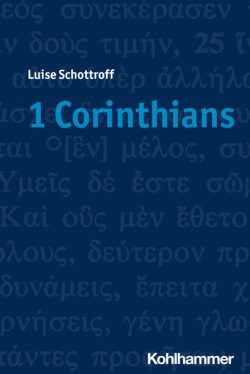Читать книгу 1 Corinthians - Luise Schottroff - Страница 24
На сайте Литреса книга снята с продажи.
1:14–17
ОглавлениеThese sentences suggest that those who have performed baptisms are accorded special authority by some of their followers, allowing them to make competing in-group delineations. We learn from a treatise by Tertullian (died after 200 CE) that he knows of conflicts about baptism that are comparable in structure to the conflict in Corinth. Tertullian would essentially like to restrict the right to baptize to the bishop and to ecclesiastical office holders authorized by him to perform it. On the other hand, he finds himself having to accept the right of all believers to baptize. Therefore, he establishes restrictions on this universal right to baptize. He speaks with vigor against women taking upon themselves the right to baptize or having it conferred upon them. In this context it becomes clear that there were, therefore, conflicts in which the egalitarian position was maintained by appealing to Paul.55 The controversy over the right of women to baptize shows, on the one hand, that a special quality is attributed to those who baptize, but that this, on the other hand, is in conflict with the egalitarian character of the congregation. In 1 Corinthians Paul mentions no women as baptizers, only men, to whom, on account of the baptism, a special quality is ascribed, a quality that extends to those baptized by them. So Paul has nothing to say about women as baptizers. And yet, from the discussion into which Tertullian gives us a look and from Acts 18:1–3, we have grounds for supposing that Prisca also baptized people in Corinth.
Paul tries in 1:14–17a to minimize as much as he can his role as a baptizer in order to prevent anyone from appealing to being baptized by Paul as a basis for special privileges.
1:14 Chrispus could be identical with the head of the synagogue in Acts 18:8, who became a believer in the messianic proclamation and appears to have had influence in Corinth. Paul does not mention—in contrast to Acts—that his »house« (his family and slaves) became members of the messianic community along with him.
Gaius is probably identical with the Gaius in Rom 16:23. There he is named as the host to Paul and to the entire congregation/community. Attempts to learn something about the economic and social status of the two men from the minimal information we possess have remained quite hypothetical. Gaius is possibly one of the well-to-do members of the congregation,56 if Rom 16:23 means that he could offer a meeting place to several house congregations at the same time.
1:16 Stephanus and his household are mentioned in more detail in 16:15–18. From this information we cannot conclude that he was well-to-do but that he lived somewhat above the subsistence level economically.57
1:17 For Paul competition within the congregation stands in contradiction to the fact that Jesus the Messiah died on the cross. The congregation in Corinth, each and every one of its members, entrusted themselves to this Messiah and to the God of Israel. In a Roman city, to trust in a Messiah as liberator/kyrios who was crucified for the sake of Roman political interests, creates structures for living together and for ordering your life different from those in the society in which you grew up. In it such competition is the order of the day (3:3, etc.). In the body of Christ things are different. The theme »cross« does not make a sudden appearance, as has often been thought, nor is 17b a transition to a new theme,58 but an intensification of what has been the theme since 1:10. The inner connection of the themes competition and crucifixion is also evident in chapters 3 and 4 (see, for example, 3:3 and 3:18–23). Caesuras between 1:17 and 1:18 make this connection invisible.
»Not with eloquent human wisdom«/sophia logou—that’s how Paul delineates the gospel in 1:17. What kind of wisdom is Paul here (cf. 2:1) essentially excluding?
